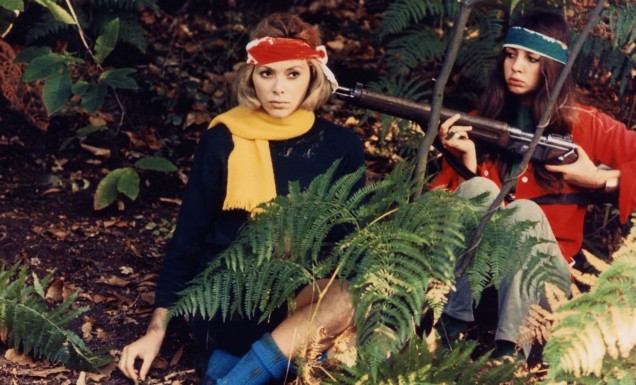Week End
pustolovna satira, France, 1967
DIRECTED BY: Jean-Luc Godard

CAST:
Mireille Darc,
Jean Yanne,
Jean-Pierre Kalfon
SCRIPT:
Jean-Luc Godard,
Julio Cortázar
PHOTOGRAPHY:
Raoul Coutard
MUSIC:
Antoine Duhamel
EDITING:
Agnès Guillemot
Synopsis:
Roland and Corinne Durand are a bourgeois married couple. He has a lover and she has a lover, and both plot against each other with the intention of killing the other. They set off on a trip to the countryside, towards Corinne's parents' house, to claim her dying father's life insurance, ready to kill her father if necessary. The road turns into picturesque chaos - first they come across a kilometer-long traffic jam due to a traffic accident, and after they manage to find a detour, they come across cars killed in accidents and corpses. Eventually, they run into members of a terrorist ultra-left organization who capture them...
The Weekend is one of the key films in the oeuvre of the legendary Jean-Luc Godard: it was the peak of his previous deconstruction-political, stylistically hybrid artistic aspirations, and the significant inscription with which the film ends - "The end of the film/the end of the world" was the announcement of Godard's departure from the official cinematography and the transition to collectivist guerilla production within the Dziga Vertov group he founded with Jean-Pierre Gorin. The Weekend is a film of nihilistic destruction and self-destruction, compared to Alice in Wonderland, the James Bond series and the poetry of the Marquis de Sade, and one of the first scenes, the one in which Corinne tells her lover about a sexual experience she had, is partially based on the Story eye of Georges Bataille. If Julio Cortazar is to be believed, the indirect inspiration for the film came from his story The Southern Highway, the idea of which was presented to Godard without citing the source, so the famous filmmaker was not even aware that the work of the Argentine literary classic was partially the basis of his film. In any case, Vikend is the most radical realization of the first phase of Godard's oeuvre in terms of form and meaning, his darkest work in general, a disconcerting combination of grotesque socio-political allegory, black satirical comedy and an occasional pro-meditative approach, and it is famous for its multi-minute frame-sequence filmed with continuous lateral movement of the camera, which was a unique technical feat at the time. The cannibalistic motive associated with the characters of the self-proclaimed revolutionaries is also remembered, especially in the very ending, one of the most disturbing in the history of the film.
color, 97'